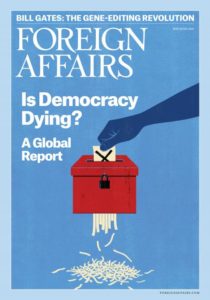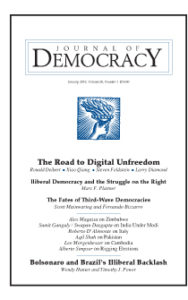 Foreign Affairs, which has published a number of pieces dealing with technology and authoritarianism, asked a broad pool of experts whether technological change today is strengthening authoritarianism relative to democracy.
Foreign Affairs, which has published a number of pieces dealing with technology and authoritarianism, asked a broad pool of experts whether technological change today is strengthening authoritarianism relative to democracy.
In the past, the assumption was that wider distribution of technology would disproportionately empower citizens to demand political reform and strengthen democratic governance, said Shanthi Kalathil, Senior Director of the International Forum for Democratic Studies at the National Endowment for Democracy:
Yet, in our current era, this has been outpaced by the emergence on the global stage of powerful autocratic and illiberal actors who deliberately bend technological development, governance, norms and usage to authoritarian aims, and/or utilize existing major tech platforms and tools to undermine trust and corrode democracy. To shift this balance, democratic governments, civil society, and the private sector must proactively and collectively address these issues, not rely on outdated assumptions that technology itself is sufficient to drive democratic progress.
 The mix of positive and negative effects of technological change on the relative success of authoritarianism and democracy is extremely complex—I don’t think anyone can calculate the balance sheet with great precision, said Thomas Carothers, Senior Vice President for Studies at the Carnegie Endowment for International Peace.
The mix of positive and negative effects of technological change on the relative success of authoritarianism and democracy is extremely complex—I don’t think anyone can calculate the balance sheet with great precision, said Thomas Carothers, Senior Vice President for Studies at the Carnegie Endowment for International Peace.
There is no question that this is happening, said Larry Diamond, Senior Fellow at the Hoover Institution and at the Freeman Spogli Institute for International Studies at Stanford University. But he qualifies response because:
- first, there are also counter-trends of movements for democratic change and improvement using digital technology for good;
- second, organizations such as Jigsaw (of Google/Alphabet) are continuing to innovate to circumvent and protect against authoritarian intrusions; and …
 third, autocracies such as Russia and China suffer intrinsic and deepening vulnerabilities which technology alone cannot indefinitely defend against.
third, autocracies such as Russia and China suffer intrinsic and deepening vulnerabilities which technology alone cannot indefinitely defend against.
The course and the effects of technological change are difficult to predict, said Marc F. Plattner, Founding Coeditor of the Journal of Democracy:
A decade or two ago it appeared that the Internet and other communications technologies were strengthening democracies and threatening authoritarian regimes. Today I feel confident in asserting that authoritarian regimes are being strengthened and democracies are under threat. But it is possible that, with further technological advances, the pendulum will swing again.







